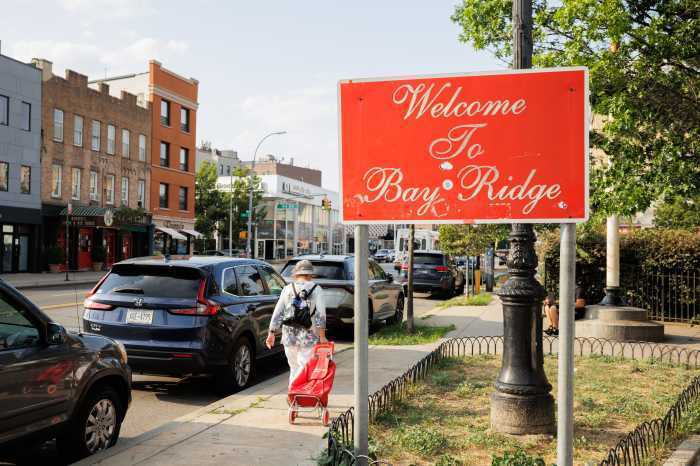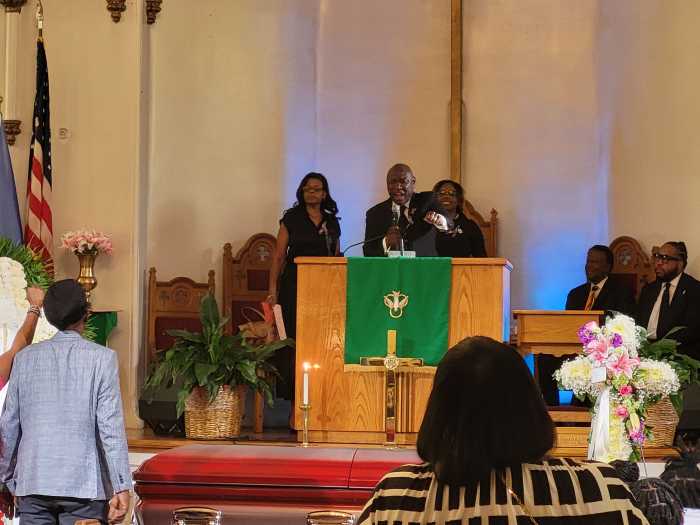A Sixth Circuit Court of Appeals panel has found that the Supreme Court’s recent marriage equality ruling in Obergefell v. Hodges is irrelevant to an equal protection claim by two gay men regarding the way they were treated while being arrested in 2011.
In an August 3 ruling in Ondo v. City of Cleveland, the panel found that police conduct in the arrest of Steven Ondo and Jonathan Simcox is subject to “rational basis” review — a lenient standard of judicial scrutiny — under which officials demonstrated they had a rational basis for refusing to let the two wear pants for the ride to the police station and during the booking process.
The ruling stated that the police’s actions were justified “even if motivated in part by sentiments regarding homosexual behavior.” The plaintiffs alleged they were subjected to hostile treatment by the cops, who told them, when they wanted to get dressed prior to being taken away, that “faggots don’t wear pants in jail.”
Cleveland police conduct in case where two men allege homophobic treatment is upheld
In her opinion for the panel, Judge Alice M. Batchelder found that Sixth Circuit precedent required that the officials’ actions be subjected to “rational basis” review rather some form of heightened scrutiny that would have required a more demanding examination of the police actions.
Deficiencies in the way the two men brought their suit appear to have made the city’s case even easier to sustain.
Ondo and Simcox, roommates, were returning home after several hours of drinking at about 2 a.m. on April 2, 2011 when, according to Batchelder’s opinion, they “got into a heated argument outside their apartment building.” When a neighbor came out to confront them about the noise, Simcox told him to “fuck off.”
“An altercation ensued between the three men,” Batchelder wrote, “during which the neighbor identified himself as an off-duty police officer.”
Six days later, a SWAT team showed up at Ondo and Simcox’s apartment to execute arrest warrants. Ondo and Simcox were not dressed at the time, wearing only boxer shorts, and they allege that when they asked to be allowed to put on pants, the officers said “faggots don’t wear pants in jail.” One officer, they claim, said, “It’s a house full of fags here.” The two men also allege they were dragged down to the police station in their underwear and not given jumpsuits to wear until well after they were booked, an allegation the trial judge concluded was contradicted by other evidence.
Ondo and Simcox filed a federal civil rights lawsuit against the City of Cleveland and 17 police officers in January 2012, but their complaint was deficient in not specifying factual allegations against individual officers. Even an amended complaint fell short on this. The city got several of the defendants dismissed from the case, so that it was narrowed down to the SWAT team members, at which point Cleveland moved for summary judgment.
Responding to that motion, the plaintiffs alleged further facts in affidavits based on “personal knowledge and belief.” Those affidavits, however, failed to specify which facts were based on “personal knowledge” and which were based on “belief.” Accordingly, the city moved to strike the affidavits from the court record and the court granted the motion, ruling that only factual assertions based on personal knowledge provided a sufficient basis for the plaintiffs’ equal protection claim against specific police officers.
At that point, the court granted the city’s summary judgment motion, and Ondo and Simcox appealed.
The men’s equal protection claim, according to their counsel, boiled down to the contention that the police refused to let the men wear pants over their boxer shorts because they were gay, and this constituted unconstitutional unequal treatment. The plaintiffs argued that “state actions involving homosexuals should trigger some form of heightened scrutiny under the Equal Protection Clause.”
The panel did not accept that assertion.
“First, Plaintiffs cannot demonstrate that the state action of which they complain burdens a fundamental right,” Batchelder wrote. “When the Supreme Court held that state laws against sodomy violate the Due Process Clause, it did so using the language of rational-basis review, rather than any form of heightened scrutiny. The Court did not hold that the Constitution includes a fundamental right to homosexual conduct.”
Nothing in the recent Supreme Court marriage equality ruling changes that, she continued.
“Whether the Court’s recent decision in Obergefell v. Hodges recasts engaging in homosexual acts as a fundamental right is irrelevant,” the judge wrote, “because the decision by the police relevant here does not impair Plaintiffs’ ability to engage in such conduct. Nor can Plaintiffs establish that homosexuals are a suspect or quasi-suspect class. The Court has never held that homosexuals satisfy the criteria for such classification.”
Noting that “the Supreme Court has not recognized any new constitutionally protected classes in over four decades and instead has repeatedly declined to do so,” Batchelder wrote, “Moreover, the Court has never defined a suspect or quasi-suspect class on anything other than a trait that is definitively ascertainable at the moment of birth, such as race or biological gender. In Obergefell, the Court was explicitly asked by the petitioners and various amici to declare that homosexuals are a specially protected class, and thus that government actions that disfavor homosexuals are subject to heightened scrutiny. But the Court held only that the Equal Protection Clause was violated because the challenged statutes interfered with the fundamental right to marry, not that homosexuals enjoy special protections under the Equal Protection Clause.”
Applying a rational basis standard of scrutiny, the court found that the police provided an adequate basis for their decision to arrest the men and take them to the police station in their underwear — concern for the officers’ safety, as the two men were agitated and were being arrested for assaulting a police officer. That action, the court found, “is presumed valid and rationally related to a legitimate public interest.”
Acknowledging that there might have been some anti-gay behavior by the police involve, Batchelder nevertheless wrote, “Plaintiffs’ grievance regarding being kept in their boxer shorts until the police could issue them jumpsuits, even if motivated in part by sentiments regarding homosexual behavior, still does not violate the Constitution.”
Judge Jeffrey Sutton, who concurred in the court’s decision but differed with the majority about whether it was even necessary for it to consider the equal protection claims Ondo and Simcox made, was the author of last year’s Sixth Circuit opinion, reversed by the Supreme Court in Obergefell, that found that the marriage plaintiffs’ equal protection claim was not subject to heightened scrutiny — for essentially the same reasons that Batchelder articulated in this ruling.
Ondo and Simcox were represented by Sara Gedeon on the appeal.


































